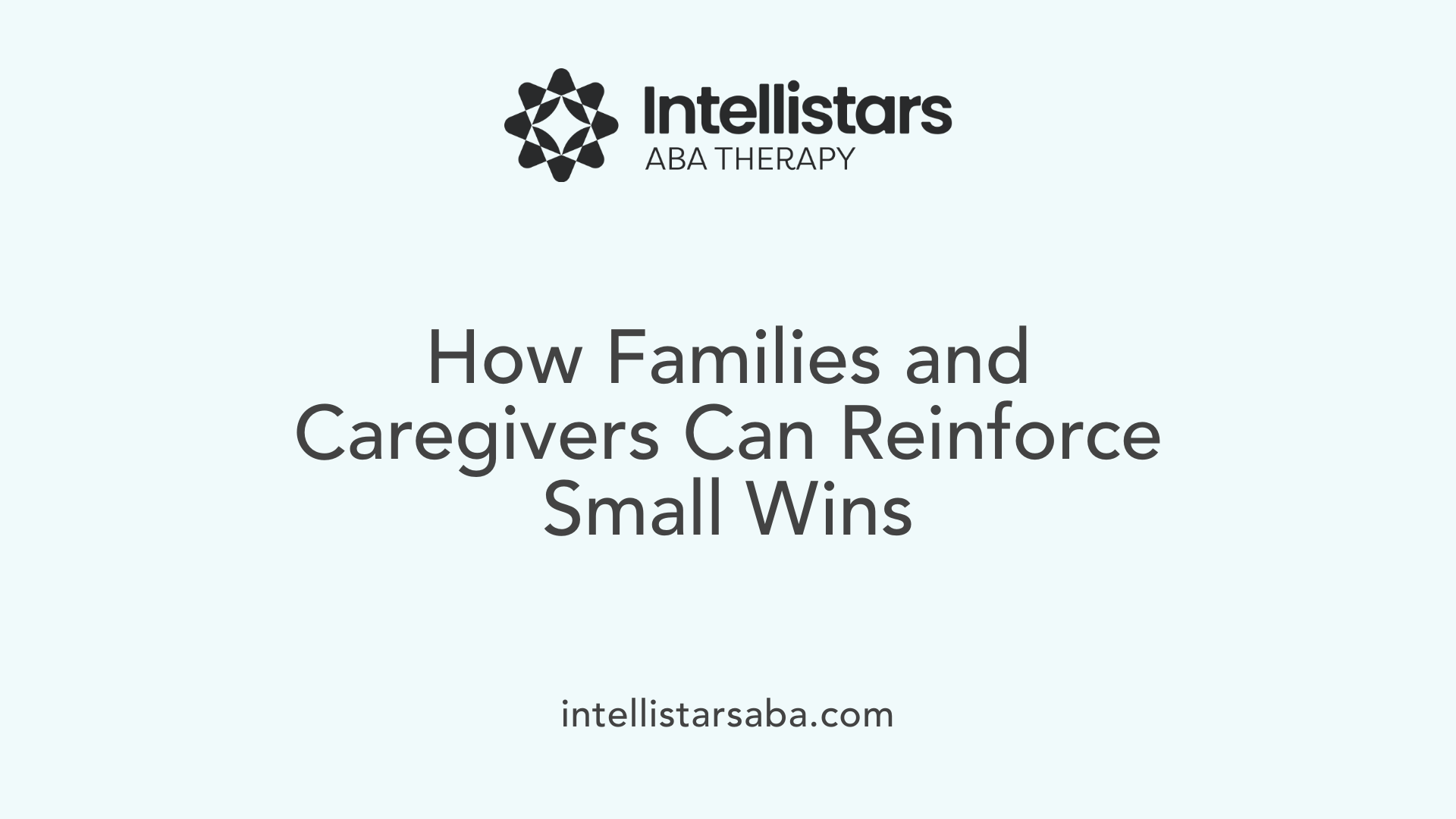Understanding ABA Therapy and Its Impact
Applied Behavior Analysis (ABA) therapy has become the cornerstone treatment approach for individuals with autism, providing structured, evidence-based methods to foster skill development and reduce challenging behaviors. By tailoring interventions to each individual's needs, ABA enhances communication, social interactions, daily living, and emotional regulation. This article explores the essential role of celebrating small wins within ABA therapy, illuminating how these acknowledgments drive motivation, reinforce progress, and cultivate resilience in those undergoing treatment.
What is ABA Therapy and How Does it Help?

What is Applied Behavior Analysis (ABA) therapy for autism?
Applied Behavior Analysis (ABA) therapy is a science-based behavioral intervention designed to support individuals with autism spectrum disorder (ASD). Its primary goal is to help improve essential skills like communication, social interaction, and independence, while also reducing challenging behaviors. ABA achieves this by understanding how behaviors are influenced by the environment and applying strategies such as positive reinforcement to encourage desired behaviors.
ABA therapy is highly structured and tailored to each person's unique needs. Qualified behavior analysts create individualized treatment plans that break down complex skills into smaller, manageable steps. Techniques such as Discrete Trial Training (DTT), which involves repetitive practice in a controlled setting, and Natural Environment Training (NET), which encourages learning through everyday activities, are commonly used.
What are the main goals and focus areas of ABA therapy?
ABA therapy focuses on multiple areas to support holistic development. Key skill areas include:
- Communication: Enhancing both verbal and non-verbal methods to express needs and interact with others.
- Social Skills: Developing abilities such as making eye contact, taking turns, understanding emotions, and initiating conversations.
- Daily Living Skills: Teaching self-care activities like dressing, hygiene, and simple household tasks to promote independence.
- Behavior Management: Identifying triggers for challenging behaviors such as tantrums and aggression, and teaching appropriate alternatives.
- Academic and Emotional Development: Supporting foundational learning skills and emotional regulation strategies.
By targeting these areas, ABA therapy aims to improve overall functioning and quality of life.
What evidence supports ABA therapy, and how is it individualized?
ABA is widely recognized as the gold standard for autism treatment due to its evidence base. Research has shown that early, consistent ABA therapy — especially when started between ages 2 and 6 — leads to long-term benefits. These include improvements in intellectual functioning, language, adaptive behaviors, and skill generalization across different environments.
Treatment plans are customized for each individual, considering their strengths, challenges, and family involvement. Caregivers are educated and actively participate to reinforce learning at home, enhancing therapy effectiveness. The consistent use of positive reinforcement motivates progress and builds confidence, while celebrating small wins supports ongoing resilience and emotional flexibility.
As an evidence-backed approach, ABA therapy continues to be recommended by major health authorities and supported by ongoing research, underscoring its vital role in fostering meaningful development for children with autism.
Who Provides ABA Therapy Services?
Who Provides ABA Therapy Services?
ABA therapy services are typically provided by a range of trained professionals specialized in applied behavior analysis. Leading roles are often filled by Board Certified Behavior Analysts (BCBAs) and licensed behavior analysts who design and oversee individualized treatment plans. These plans are implemented by registered behavior technicians (RBTs), therapists, or counselors who have specific training in ABA techniques.
Treatment Settings and Team Collaboration
ABA therapy is delivered in diverse settings such as the home, schools, clinics, and community environments. This flexibility ensures that therapy aligns with the child’s everyday life, promoting the generalization of skills. Collaboration among the therapy team—including behavior analysts, therapists, educators, and medical professionals—is essential to provide comprehensive care.
Role of Family and Caregivers in Therapy
Family involvement is integral to ABA therapy’s success. Caregivers are educated and supported to implement ABA strategies consistently, fostering continuous progress outside of sessions. By participating actively, families help maintain consistency across environments and strengthen skill development, making therapy more effective and sustainable.
Core Techniques Used in ABA Therapy
What techniques are commonly used in ABA therapy?
ABA therapy employs several effective techniques designed to support learning and behavior change in children with autism.
One foundational method is Discrete Trial Training (DTT). This technique uses structured, repeated trials that focus on teaching specific skills step-by-step under controlled conditions. Each trial includes a clear instruction, the child's response, and a consequence such as a reward for correct answers, helping children learn quickly and reliably.
Another essential approach is Natural Environment Training (NET), which emphasizes learning within everyday settings like home or playgrounds. NET encourages children to acquire skills naturally through play and routine activities, making skills more meaningful and easier to generalize.
Task Analysis and Chaining break down complex behaviors into smaller, manageable tasks. Each step is taught individually and linked together to form a complete skill — for example, breaking down hand-washing into sequential actions. This ensures systematic learning and mastery of daily living tasks.
The use of reinforcement strategies is central to ABA therapy. Positive reinforcement involves rewarding desired behaviors to motivate children, while negative reinforcement involves removing unpleasant stimuli when appropriate behaviors occur. These strategies increase the likelihood that beneficial behaviors will continue.
Additional techniques include prompting (providing cues), fading (gradual removal of prompts), modeling (demonstrating behaviors), and script fading for social skills development. For behavior modification, practitioners use tools like ABC (Antecedent-Behavior-Consequence) analysis to understand behavior triggers, alongside interventions such as extinction or behavior contracts.
Together, these structured and flexible techniques make ABA therapy an effective, personalized approach that fosters skill acquisition and reduces challenging behaviors.
Benefits of ABA Therapy for Individuals with Autism

How does ABA therapy benefit individuals with autism?
ABA (Applied Behavior Analysis) therapy offers numerous benefits for individuals with autism by focusing on enhancing social skills, communication, and daily living abilities. The therapy uses structured, personalized techniques that break down complex skills into smaller, manageable steps. Through positive reinforcement, ABA motivates children to learn and generalize these skills across different environments, including home and school.
Social, communication, and daily living improvements
ABA therapy promotes social engagement by teaching skills such as making eye contact, taking turns, understanding emotions, and initiating conversations. It also supports communication development by improving both verbal and non-verbal expression, which plays a crucial role in social interaction. Daily living skills like dressing, hygiene, and household tasks are taught to encourage independence and increase autonomy.
Reducing challenging behaviors and teaching alternatives
Challenging behaviors such as tantrums, aggression, and self-injury are addressed by understanding their triggers and replacing them with appropriate alternatives. ABA's use of positive reinforcement helps reduce these behaviors by motivating children to adopt constructive responses, thereby improving their overall behavior and emotional regulation.
Long-term developmental and academic impacts
Early intensive ABA interventions (especially between ages 2 to 6) lead to significant improvements in intellectual functioning, language skills, adaptive behaviors, and generalization of skills across settings. Additionally, ABA supports academic development by enhancing foundational skills such as comprehension and problem-solving, which positively affect educational outcomes.
ABA therapy’s individualized treatment plans, family involvement, and consistent reinforcement strategies maximize effectiveness and contribute to lifelong benefits. The approach has been demonstrated to increase independence, improve quality of life, and enable many individuals with autism to thrive across social, academic, and vocational domains.
Is ABA Therapy Suitable for Everyone with Autism?
Is ABA therapy suitable for all individuals with autism?
ABA therapy is a highly evidence-based approach tailored to the individual needs of those with autism, aiming to promote positive behaviors and reduce problematic ones. While it can be effective for many individuals across a broad age range—from infants to seniors—its suitability depends on personal factors such as cognitive level, specific behavioral challenges, and family or environmental support.
How does ABA effectiveness vary across ages and challenges?
Early intervention with ABA, particularly during preschool years (ages 2-6), tends to yield significant improvements in language, social skills, and adaptive behaviors. However, ABA therapy can also be adapted for adolescents and adults to address unique goals like employment skills, emotional regulation, and independence. The therapy's flexibility allows it to be modified based on varying cognitive levels and behavioral needs, though not every individual with autism will respond equally.
Why is professional assessment and personalized planning important?
The decision to pursue ABA therapy should be made in consultation with qualified professionals. Individualized treatment plans consider a person’s strengths, challenges, and goals to maximize ABA’s effectiveness. Professionals assess cognitive abilities, specific behavioral patterns, and family involvement levels to tailor interventions and ensure a supportive environment that fosters consistent progress.
This personalized approach helps determine if ABA is suitable or if alternative or supplementary therapies need to be integrated, ensuring the best possible outcomes for each individual with autism.
The Psychology Behind Celebrating Small Wins in ABA Therapy
Role of positive reinforcement and dopamine in motivation
ABA therapy centers around positive reinforcement, where rewarding desired behaviors motivates and encourages continued effort. Celebrating small wins triggers dopamine release, a neurotransmitter linked to pleasure and motivation, which boosts the child’s drive to keep progressing. This neurochemical response helps sustain engagement and resilience during the therapy process.
How small victories create behavioral momentum
Recognizing tiny achievements fosters behavioral momentum, meaning each success builds on the previous one, encouraging ongoing steps towards larger goals. Therapists carefully identify and reinforce these small wins, which helps the child develop a pattern of success that fuels continued learning and skill acquisition.
Impact on confidence and emotional flexibility
Acknowledging small victories shifts internal narratives from self-criticism to self-compassion, enhancing self-esteem and reducing perfectionism. This process supports emotional flexibility, enabling children to adapt better to setbacks and maintain a balanced view of their progress. Therapeutic tools like journaling, sharing progress with supportive peers, practicing self-affirmations, and creating personal mantras further reinforce this positive mindset, aiding overall emotional well-being and therapy success.
Practical Ways to Recognize and Celebrate Small Wins in ABA

Therapist Strategies to Identify and Reward Progress
ABA practitioners are trained to spot even the tiniest advances in a child's behavior or skill development. They use positive reinforcement tailored to these small achievements to motivate ongoing effort and build confidence. By breaking down complex behaviors into manageable steps, therapists can celebrate each step successfully mastered, creating a momentum that encourages continued growth.
Use of Journaling, Self-Affirmations, and Personal Mantras
Therapists often encourage clients and families to maintain journals documenting incremental gains. This practice helps solidify recognition of progress and supports emotional reflection. Additionally, self-affirmations and personal mantras are recommended as daily tools to boost self-esteem and reinforce a positive internal narrative. These techniques help individuals shift from self-criticism to self-compassion.
Sharing Achievements within a Supportive Community
Celebrating small wins extends beyond therapy sessions. Clients and families are encouraged to share successes with supportive friends, family members, or support groups. This communal recognition further enhances motivation, emotional flexibility, and resilience, reinforcing the idea that progress is a collective celebration and not a solitary journey.
The Role of Family and Caregivers in Reinforcing Small Wins

Educating families to support therapy at home
Family involvement is an essential element of ABA therapy, as caregivers are educated and supported to consistently implement therapeutic strategies in the home setting. This continuous support helps reinforce the skills learned during therapy sessions, ensuring that small wins are recognized and celebrated every day.
Consistency in reinforcing progress across environments
ABA therapy emphasizes generalization, meaning that skills acquired in therapy should be applied in various natural environments such as home, school, and community. Families play a vital role in maintaining this consistency by celebrating even tiny achievements, which builds behavioral momentum and encourages ongoing progress across settings.
Encouraging positive internal narratives and resilience
Celebrating small victories with caregivers helps children develop emotional flexibility and resilience. Recognizing tiny successes can shift internal narratives from self-criticism to self-compassion, fostering greater self-esteem and reducing perfectionism. Families are encouraged to use techniques like journaling, sharing progress, self-affirmations, and mantras to reinforce these positive perspectives and motivate sustained effort.
Through education and active participation, family members create a supportive environment that nurtures growth and reinforces not only learned behaviors but also emotional well-being, significantly enhancing the overall effectiveness of ABA therapy.
Small Wins and Long-Term Success in ABA Therapy
How documented progress boosts ongoing motivation
Celebrating small wins during ABA therapy plays a vital role in maintaining motivation for children with autism. These incremental achievements activate dopamine release in the brain, fostering feelings of reward and encouraging continued effort. Therapy practitioners intentionally identify and reinforce these minor successes, which help shift internal narratives from self-criticism to self-compassion. This process builds self-esteem and reduces perfectionism, creating a positive feedback loop that sustains engagement throughout the therapy journey.
Link between incremental achievements and skill generalization
Incremental progress is not just motivational but also critical for generalizing skills learned in therapy to real-world settings. ABA’s structured approach breaks complex behaviors down into manageable steps, allowing children to master each component before moving to the next. Recognizing and reinforcing these small steps encourages behavioral momentum, helping individuals take successive actions toward broader goals. This stepwise mastery facilitates consistency and the application of skills across different environments, such as home, school, and social situations.
Contribution to lifelong improvements in independence and quality of life
The cumulative effect of acknowledging small victories contributes significantly to long-term benefits in ABA outcomes. Early and consistent reinforcement helps solidify improvements in communication, social engagement, emotional regulation, and daily living skills. As children gain independence through mastering tasks like self-care and academic skills, their overall quality of life improves. This lifelong progression is supported by active family involvement and continued practice, ensuring that skills transition smoothly into adulthood and promote autonomy and well-being.
Overcoming Challenges in Recognizing Small Wins

Avoiding Self-Criticism and Perfectionism
One of the main hurdles in recognizing small wins during ABA therapy is the tendency toward self-criticism and perfectionism. Many individuals focus on shortcomings rather than progress, which can hinder motivation. Celebrating incremental achievements helps shift this negative internal narrative toward self-compassion and encourages a healthier mindset.
Developing Emotional Flexibility to Handle Setbacks
Therapy includes building emotional flexibility, a crucial skill that allows individuals to cope with setbacks without losing confidence. Recognizing that progress is not always linear helps clients and families maintain resilience and stay committed to long-term goals.
Maintaining Momentum Through Balanced Progress Views
Acknowledging small victories acts as behavioral momentum, motivating individuals to take consecutive steps toward their objectives. Practitioners encourage journaling, sharing progress, and practicing affirmations to maintain a balanced perspective on achievements, preventing discouragement from minor setbacks and fostering sustained engagement in therapy.
Embracing Small Steps for Lasting Growth
Celebrating small wins in ABA therapy is not merely a feel-good practice but a fundamental therapeutic strategy that underpins sustained progress and emotional well-being. By acknowledging every incremental success, therapists and families help individuals with autism build confidence, resilience, and motivation, creating a positive cycle that propels continued development. These small victories contribute significantly to the broader goals of ABA—improving communication, social skills, independence, and quality of life. Embracing and reinforcing these moments paves the way for meaningful, lifelong growth and empowerment for those on the autism spectrum.
References
- Top 7 Benefits Of ABA Therapy For Autistic Children
- 10 Benefits of ABA Therapy for Autism in the Coachella ...
- Harnessing the Power of ABA Therapy Benefits
- How Celebrating Small Wins Can Boost Your Mental Health
- Applied Behavior Analysis (ABA) Services | dmh.mo.gov
- Applied Behavior Analysis (ABA)
- Applied Behavior Analysis (ABA)






